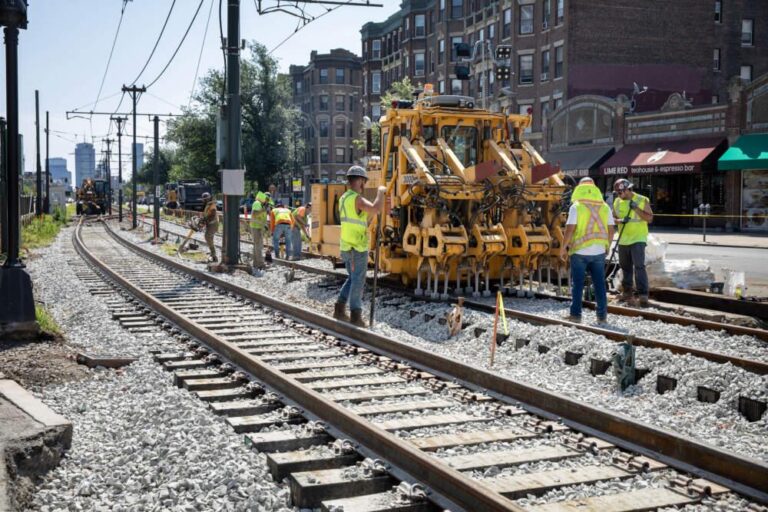In a groundbreaking move, the Massachusetts Bay Transportation Authority (MBTA) is poised to complete five years’ worth of infrastructure and accessibility upgrades in just 30 days.This ambitious acceleration targets critical improvements across the Green Line and other key transit corridors, promising to enhance safety, reliability, and accessibility for thousands of daily commuters. The rapid timeline reflects a concerted effort by MBTA leadership and state officials to minimize disruption while delivering long-overdue modernizations,including ADA-compliant station renovations,amid a backdrop of sustained investment and community coordination.
Table of Contents
- MBTA Accelerates Major Infrastructure Projects to Meet Tight Deadline
- Challenges and Risks of Compressing Five Years of Work into One Month
- Impact on Commuters and Strategies for Minimizing Disruption
- Recommendations for Ensuring Safety and Quality Amid Rapid Construction
- Insights and Conclusions
MBTA Accelerates Major Infrastructure Projects to Meet Tight Deadline
The MBTA is pushing the boundaries of rapid infrastructure advancement by compressing what is typically a five-year timeline into just 30 days. This unprecedented acceleration is part of an ambitious effort to enhance service quality and reliability across the network, particularly focusing on the Green, Orange, Red, and Mattapan lines. The agency’s integrated transit programs are leveraging advanced project management techniques and increased funding allocations to ensure key upgrades are completed within this tight window.
Key areas targeted for swift completion include:
- Replacement of aging tracks and signals
- System-wide accessibility improvements
- Installation of climate resilience infrastructure
- Modernization of vehicle fleets
These accelerated projects are part of a broader $9.8 billion capital plan aiming to modernize Greater Boston’s transit system for long-term sustainability and rider satisfaction. Despite historically only a fraction of requested funds being allocated, the recent surge in budget approval and commitment reflects the MBTA’s determination to meet its deadlines and deliver transformative progress for the community.
Challenges and Risks of Compressing Five Years of Work into One Month
The accelerated timeline poses significant logistical and operational hurdles. Compressing half a decade’s worth of projects into a single month demands an unprecedented scale of coordination across multiple teams, equipment, and stakeholders. There is a heightened risk of resource bottlenecks, from workforce availability to critical parts and machinery, which could lead to delays or compromises in quality. Furthermore, the tight schedule increases the likelihood of errors, as there is less time for thorough testing, inspections, and contingency planning, perhaps threatening the long-term reliability and safety of the MBTA system.
Key challenges include:
- Ensuring seamless dialog and collaboration among contractors and MBTA personnel under extreme time constraints.
- Maintaining worker safety amid an intense and continuous work pace.
- Balancing speed with the technical precision required for complex rail infrastructure overhauls.
- Mitigating disruption impact to daily commuters who rely on MBTA services.
Failing to adequately address these risks could result in costly rework, service interruptions, or public backlash. The aggressive timetable not only tests operational capabilities but also strains financial and reputational capital, making contingency strategies and obvious progress tracking essential throughout this historic endeavor.
Impact on Commuters and Strategies for Minimizing Disruption
Commuters can expect a notable impact as the MBTA accelerates a massive construction schedule, compressing five years of work into a single month. Lengthy service interruptions and rerouted trains are certain, placing added strain on daily travelers. However, the transit authority has proactively rolled out a comprehensive communication strategy aimed at keeping riders informed and prepared. This includes real-time updates via mobile apps, enhanced station signage, and targeted outreach campaigns to educate passengers on option routes and timing adjustments.
To ease the burden and maintain service continuity, the MBTA is implementing several key measures:
- Expanded shuttle bus services to bridge critical gaps along affected lines.
- Increased frequency on parallel routes to absorb passenger overflow.
- Temporary fare adjustments and flexible ticketing options to accommodate changed travel patterns.
- Dedicated customer service teams deployed at major hubs for on-the-spot support.
While the compressed timeline will inevitably pose challenges, the MBTA’s agile planning and robust mitigation efforts aim to minimize disruptions and keep Boston’s commuters moving as smoothly as possible through this intensive upgrade period.
Recommendations for Ensuring Safety and Quality Amid Rapid Construction
Maintaining rigorous safety protocols remains paramount when condensing extensive construction schedules. Rapid timelines demand enhanced coordination of safety management systems,including continuous hazard assessments and real-time monitoring to mitigate risks inherent to fast-paced environments. Prioritizing mandatory daily safety briefings and equipping all personnel with state-of-the-art personal protective equipment help fortify worker protection. Additionally, integrating technology-driven solutions such as wearable sensors and automated safety alerts can preemptively address potential incidents before they escalate, ensuring compliance with OSHA regulations throughout the accelerated work period.
Quality assurance must be embedded within every phase to prevent compromises due to compressed schedules. Employing modular construction techniques, coupled with stringent inspection checkpoints at critical milestones, enhances both speed and accuracy. Collaboration between multidisciplinary teams enables efficient troubleshooting and adaptation without sacrificing standards. Key recommendations include:
- Implementing layered quality controls to identify defects early
- Engaging experienced subcontractors skilled in rapid deployments
- Utilizing prefabricated materials to streamline onsite assembly
- Maintaining transparent communication channels to swiftly address emerging challenges
Insights and Conclusions
As the MBTA prepares to complete five years of planned upgrades and improvements in just 30 days, the transit authority is set to deliver a transformative boost to Boston’s public transportation landscape.This accelerated timeline highlights a bold commitment to efficiency and modernization, promising enhanced service reliability and rider experience.Commuters and city officials alike will be watching closely as the MBTA strives to meet this unprecedented goal, signaling a new era for the region’s transit system. For further insights into MBTA operations and upcoming changes, ongoing discussions and reports can be followed on dedicated transit forums and official budget oversight updates.

